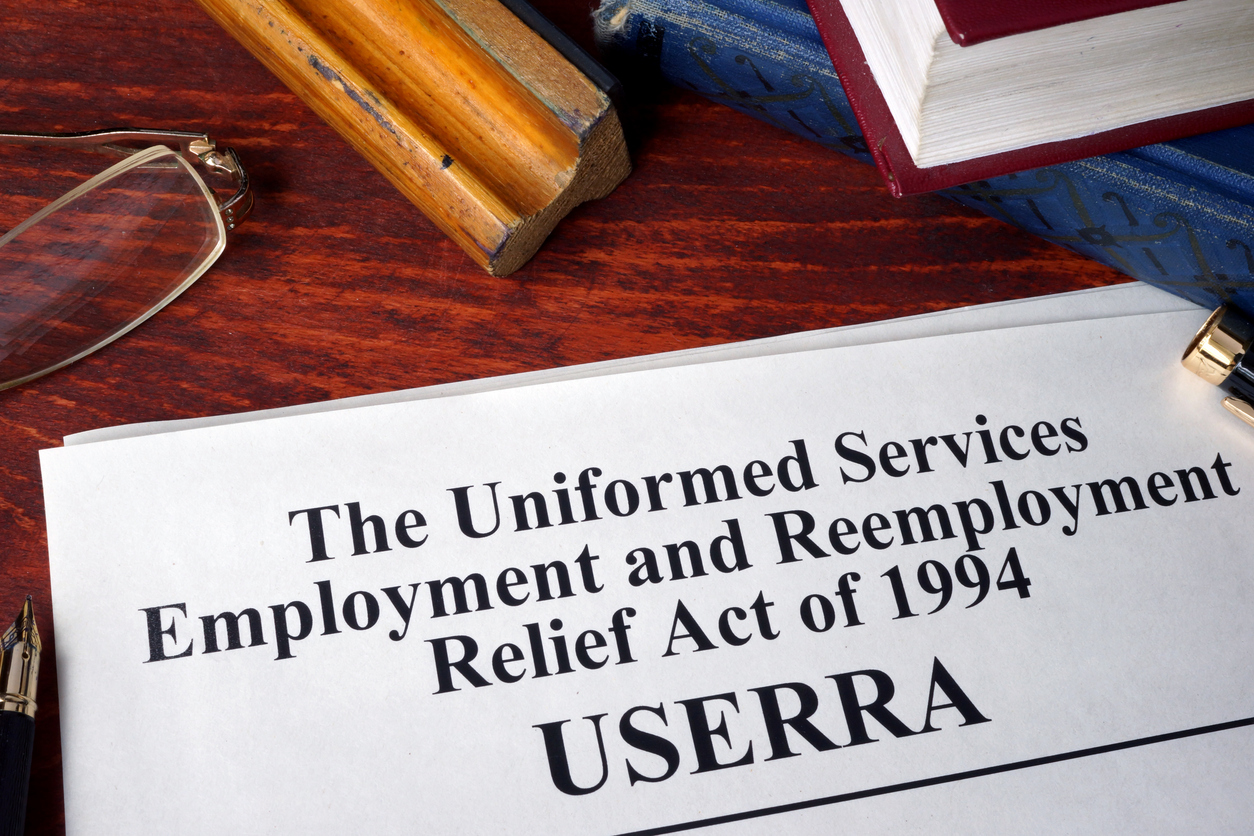
Written by
Germeen Tanas
Germeen is an aPHR-certified writer on the marketing team at BerniePortal. She writes about HR, healthcare, and benefits.
Employer Requirements Under USERRA

In 2023, LeRoy Torres, an army reservist and Texas state trooper, was awarded $2.49 million in a USERRA lawsuit. Torres was deployed in Iraq where he was exposed to toxic burn pits that caused toxic brain injury. As a result of his deployment, he also developed a severe respiratory condition that disabled him from doing his job.
When he returned from Iraq, he asked his employer, the Texas Highway Patrol, to re-employ him in a role he could perform. They refused on the basis that state employers were “immune” from USERRA requirements, and so the case went to the U.S. Supreme Court. The court ruled that state employers are not immune from USERRA, and Torres quickly won the lawsuit.
Employers have even greater accommodation duties under USERRA than they do under the Americans with Disabilities Act (ADA). The Torres case emphasized the far-reaching nature of USERRA as it applies to all employers. It’s critical that employers understand and comply with USERRA regulations.
What Is USERRA?
The Uniformed Services Employment and Reemployment Rights Act (USERRA) was passed in 1994 to prohibit discrimination on the basis of military obligations. USERRA ensures military members can return to the job they had before taking military leave. It mandates job-protected military leave for up to five years and applies to all U.S. employers regardless of size or location.
USERRA protects all military members including:
-
Active duty military members
-
Reservists
-
National Guard members
-
Those serving funeral honors duties
-
Those needing time off to participate in fitness and other examinations by the US military
-
Those needing time off to participate in training
-
Those serving in active components of the National Disaster Medical System (NDMS) and the Federal Emergency Management Agency (FEMA)
What Is the Purpose of USERRA?
According to Title 38 of the United States Code, the purpose of USERRA is to:
-
Encourage non career service in the uniformed services by minimizing career and employment disadvantages to joining the uniformed services
-
Minimize the disruption to the lives of members of the uniformed services as well as to their employers, fellow employees, and communities by providing for their prompt reemployment upon completion of service
-
Prohibit discrimination against persons because of their service in the uniformed services
USERRA Regulations and Special Considerations
The Department of Labor, which enforces USERRA, highlights special provisions that are important to keep in mind for USERRA compliance.
In summary, under USERRA:
-
Employment discrimination because of past, current, or future military obligations is prohibited. This includes all stages of employment including hiring, promoting, termination, and benefits. As the legislation states: “An employer must not deny initial employment, reemployment, retention in employment, promotion, or any benefit of employment to an individual on the basis of his or her membership, application for membership, performance of service, application for service, or obligation for service in the uniformed services” (See Section 4311 / 20 CFR 1002.18 - .23).
-
Returning service members must be reemployed in the job that they would have attained had they not been absent for military service, unless they were separated from service due to dishonorable discharge.
-
Employees are protected regardless of whether they are full-time, part-time, on a current leave of absence, etc.
-
Employers must give employees on military leave the same benefits they would have received if they had not taken military leave.
-
Employers must protect health insurance of employees who leave to perform military service (for up to 24 months). If an employee lets their coverage lapse, they have the right to reenter their employer’s health plan upon reemployment.
-
Military leave cannot create a break in service for retirement plan purposes.
-
Employers cannot retaliate against anyone who files a USERRA complaint, participates in a USERRA investigation, or exercises USERRA rights.
-
Employers are only excused from making efforts to accommodate returning service members who have disabilities if doing so would cause “undue hardship”.
Employees must provide advance oral or written notice of the need for leave. However, employers cannot request notice by a certain date as some military operations are secretive or unexpected.
USERRA Employee Notice Requirements
Per Section 4334 of the act, employers must give employees notice of rights and obligations under the law via a notice called “Your Rights Under USERRA”. This should be posted in a conspicuous area of the workplace, and given directly to employees. You can download a free PDF of the USERRA Poster in English or Spanish on the DOL’s website.
Penalties for violating USERRA include court action, back pay, lost benefits, liquidated damages including attorneys’ fees and litigation expenses, and double damages for willful violations.
Additional Resources
You can stay informed, educated, and up to date with important HR topics using BerniePortal’s comprehensive resources:
-
BernieU—free online HR courses, approved for SHRM and HRCI recertification credit
-
BerniePortal Blog—a one-stop shop for HR industry news
-
HR Glossary—featuring the most common HR terms, acronyms, and compliance
-
Resource Library—essential guides covering a comprehensive list of HR topics
-
HR Party of One—our popular YouTube series and podcast, covering emerging HR trends and enduring HR topics
-
Community—the HR Party of One Community forum, a place devoted to HR professionals to ask questions, learn more, and help others

Written by
Germeen Tanas
Germeen is an aPHR-certified writer on the marketing team at BerniePortal. She writes about HR, healthcare, and benefits.
Related Posts
Each year, new state and local regulations take effect, and with a new administration...
As we approach 2025, it's essential for HR professionals to plan for the upcoming year's...
From major holidays to key compliance and ACA deadlines, here’s everything you need to...








Submit a Comment